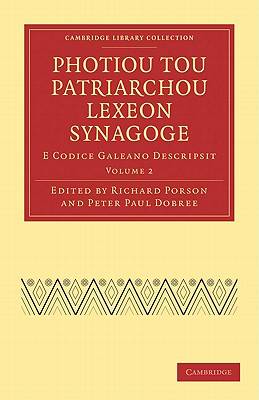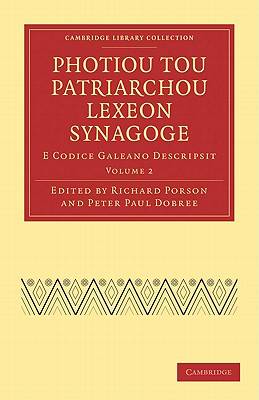
- Afhalen na 1 uur in een winkel met voorraad
- Gratis thuislevering in België vanaf € 30
- Ruim aanbod met 7 miljoen producten
- Afhalen na 1 uur in een winkel met voorraad
- Gratis thuislevering in België vanaf € 30
- Ruim aanbod met 7 miljoen producten
Zoeken
Omschrijving
This work, first published in 1822, was edited by Peter Paul Dobree (1782-1825) who had been entrusted with the literary remains of the eminent classical scholar Richard Porson (1759-1808). It contains the text of a ninth-century Greek lexicon compiled by Photius, Patriarch of Constantinople. The lexicon was a tool for Byzantine Greeks studying the works of ancient authors, whose language and vocabulary differed significantly from the day-to-day language spoken in the Byzantine Empire. The lexicon offers the modern scholar a wealth of information regarding ancient works that Photius had access to but are no longer extant. The edition is based on a transcription, made by Porson, of the only remaining manuscript of the lexicon: Codex Galeanus, in Trinity College Library, Cambridge. Volume 2 contains entries for the letters pi to omega. The edition has served as an important source for the study of Byzantine lexicography.
Specificaties
Betrokkenen
- Auteur(s):
- Uitgeverij:
Inhoud
- Aantal bladzijden:
- 476
- Taal:
- Engels
- Reeks:
Eigenschappen
- Productcode (EAN):
- 9781108016506
- Verschijningsdatum:
- 15/07/2010
- Uitvoering:
- Paperback
- Formaat:
- Trade paperback (VS)
- Afmetingen:
- 140 mm x 216 mm
- Gewicht:
- 598 g

Alleen bij Standaard Boekhandel
+ 212 punten op je klantenkaart van Standaard Boekhandel
Beoordelingen
We publiceren alleen reviews die voldoen aan de voorwaarden voor reviews. Bekijk onze voorwaarden voor reviews.








